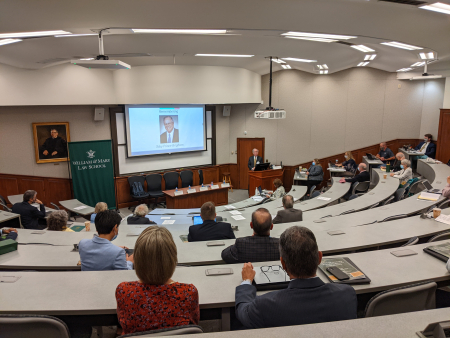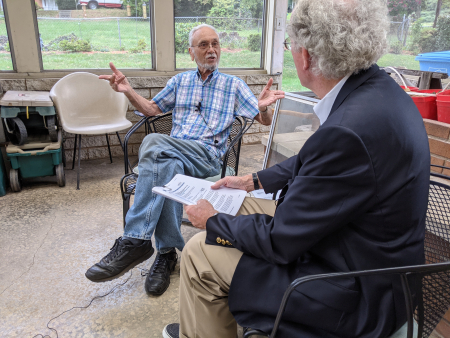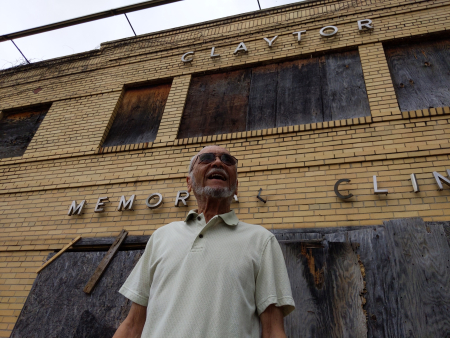 Joe Waldo leading off the Conference with a remembrance of
Joe Waldo leading off the Conference with a remembrance of
Toby Prince Brigham, for the eminent property rights practitioner
for whom the Conference is named.
I was honored to speak today at the 2021 Brigham-Kanner Property Rights Conference, and here’s a rough transcript of my remarks.
Seeking Justice Through Just Compensation
Dean Spencer, Professor Been, Professor Butler, and colleagues.
The title of our session is “The Relationship between Eminent Domain and Social and Racial Injustice,” and my colleagues have ably covered the ways in which limitations on the power to take can move us towards justice. And there is little I might add to their contributions, except to note this, a quote from a commentator in a recent story about historical “slum clearance” in the Tampa, Florida, area:
“If you want to know where historic Black neighborhoods were once located, look for a sports arena or the highway.”
My mother’s family — who came to Hawaii from Japan as contract laborers in the last part of the 19th century — lived in a corrugated tin-roofed, dirt-floor shack that they called home, on a sugar plantation next to Pearl Harbor. Any guesses what is there today? That’s right, a parking lot for a football stadium.
So I can’t really add to my colleagues’ contributions today. But I have noticed one thing. And that is that the legal academy does not focus a whole lot on that other part of the Fifth Amendment. The part that comprises the vast majority of “takings” cases on the docket of the courts. (You practitioners know where I am headed with this one.)
That’s right — the Just Compensation Clause.
I think we unjustly tend to overlook the Just Compensation requirement, treating it almost as an afterthought. Or, perhaps worse yet, as merely about money, or crunching numbers — mostly an uninteresting scrivener’s or accountant’s exercise to be determined after we’ve resolved the more interesting questions of whether an exercise of eminent domain is for public use, or whether a regulation so limits the use and enjoyment of property that from the owner’s perspective, the government might as well be appropriating it.
I suspect that the mis-impression that the inquiry is, at heart, one about filthy lucre, is one of the reasons that the Just Compensation Clause receives scant attention by the academy. And we’re not alone. The Supreme Court has not reviewed a Just Compensation case since 1984. United States v. 50 Acres of Land, 469 U.S. 24 (1984) if you are taking notes.
The collective lack of attention isn’t because the law governing compensation owned to those whose property is taken for the public’s benefit and who are only asking to be put in the same position pecuniarily as if their property has not been taken, is settled, uniformly applies, and truly “just.”
To the contrary, the academy’s and the Supreme Court’s long absence has permitted the lower courts—state and federal—to wander in the jurisprudential wilderness, employing compensation rules starkly divergent from the notion that the “just” part of the Just Compensation Clause means the “full and perfect equivalent for the property taken.”
Without a focus on the compensation clause and adherence to this principle, the entire takings enterprise becomes simply an exercise in raw power, or as meaningless as a moot court.
But it wasn’t always this way.
The Just Compensation Clause once was recognized as having a leading role in what we think of as civil rights. For example, as we know, after rejecting the wholesale incorporation as a matter of Privileges and Immunities in the Slaughterhouse Cases, what was the first right in the Bill of Rights the Supreme Court selectively incorporated under the Fourteenth Amendment’s Due Process Clause?
That’s right, the Just Compensation Clause. In what might be the case whose actual holding is least remembered, even though the case is one of the most oft-cited, Chicago Burlington & Quincy Railroad v. City of Chicago, the Court held that states and municipalities have a due process obligation to provide just compensation when they take property for public use. Compensation is part of the law of the land, as Magna Carta might have put it.
(Yes, after waxing poetic about the importance of the Just Compensation Clause in the constitutional order and applying it against states and municipalities, the Court did affirm the verdict that the $1 the lower courts awarded was “just,” but we’ll overlook that today.)
And so my task today, in our limited time, to suggest to you that indeed, the “social and racial injustice” that we are committed to overcoming would also be addressed by a refocus on the Just Compensation requirement as well as the more popular takings part.That the shortfalls in the way the Just Compensation Clause is applied deserves the attention of both the academy and the judiciary because it is not only about numbers, or dollars, or some lawyers contingency fee. But is a core component of property as a civil right.
In that vein, I offer three modest proposals for seeking social and racial justice through just compensation. (And yes, I am being “modest” in the Swiftian sense of that term — for indeed, my first suggestion calls for a substantial revisit to the way we view the term “private property” in the Fifth Amendment.)
The Just Compensation Clause Requires a Valuation of Private Property Rights, Not Simply Private Property
I believe we should shift the focus in just compensation and valuation from the value of only the property taken — which does not account for all sorts of things — to valuing what the owner has actually had taken from them. All of it. In order words, value the property rights taken, not merely the property. Yes, I know this is a big “ask” (but “go big or go home” as they say).
I might lose some of my purehearted originalist colleagues when I suggest that the Fifth Amendment contains the seeds for valuing property rights, and not merely the private property taken. After all, the Fifth Amendment does say “private property shall not be taken for public use, without just compensation.” The term isn’t “private property rights.”
But it does say “private property.” Contrast the way that property is referred to elsewhere in our Constitution – as merely “property.” Like a lot of things, I’m thinking that was purposeful: that there’s a distinction between property and private property. What was that distinction?
I think a fair reading of the Fifth Amendment’s use of private property indicates the Takings Clause requires more than compensation only for the property taken and includes everything the owner is deprived of. The Constitution limits government from interfering with the owner’s rights in property, not the property itself, as the Court reminded us in Lingle.
How might this shift in focus move the needle on remedying the social and racial injustices so dramatically noted by my colleagues today?
First, it would result in full indemnity. People put a lot of meaning in their homes and businesses that just compensation law now pays zero attention to, because, the courts have concluded, the only thing the condemnor is obligated to provide is compensation for the property taken. Nothing at all for the deprivation itself, of what Professor Donald Kochan has called “the right to keep.”
One key value of property, after all, is keeping it. Using it. Passing the legacy on. Maintaining the neighborhood. Holding the place where your family is, where your friends are. Where you find sanctuary. In my experience, the Big Guys don’t see “property” the same way as the smaller owners do. They don’t see bricks and mortar, or buildings, or that place on the door jamb where you mark your children’s heights as they grow. They see property like Keanu Reeves saw The Matrix, but instead of cascading ones-and-zeros, they see property as an income stream or cash flow. Nothing wrong with that mind you, just a different view. Something tells me that Oprah doesn’t really value her Maui home — just one of many she owns — the same way my mom’s family valued that old dirt-floor plantation shack.
In sum, we should be asking: what is the cost to the owner for taking the right to keep private property?
Second, it affirms the Armstrong principle, which restates the unremarkable notion that it is only fair and just that the costs of public benefits be borne by the public as a whole, and not the individual property owner who has been required to donate their rights for the common good. The biggest part of that would be relying more on replacement cost instead of comparable sales. That would make better account for those owners who don’t want to sell. We can’t truly make you whole, so let’s try at least to make you happier. Or maybe more dignified, or more respected is a better way to phrase it. Tort and contract law does this calculation all the time; why not just compensation law?
Finally, if we were to change the focus in takings to valuation of what the owner lost — all the losses, not merely limited to valuation of the property itself — condemnors would have a more realistic understanding of the actual costs of public improvements. Maybe we would not be as eager to turn Bruce’s Beach into a vacant parcel, or we might treat the residents of Chavez Ravine or Atlantic Yards just a bit better.
Broaden the Concept of Taking of Property to Include the Actual Consequences of Public Improvements
Not that long ago, when I was an eminent domain lawyer, what made my phone ring a lot was small business owners calling to ask why — when they lost business or even the business itself goes under — because of an adjacent project — they can’t recover for these real, damaging losses. I’d ask them “was any part of your property actually condemned or expropriated?” If yes — no matter how small — we’re in business. If not, suck it up because you are likely to get diddly-squat.
On this one, we should be more like Canada. There, in a case involving what might have been that country’s most successful truck stop on what was then the only thoroughfare, the province built what amounted to a bypass freeway. Which, quite naturally, rendered the truck stop not really a truck stop any more, and it became a much less lucrative flea market.
Under current U.S. doctrine, you know what would have happened to the owner’s claim for damages (diddly-squat, most likely). But the Canada Supreme Court held that the truck stop owner was entitled to damages, even though under Canada’s approach to property rights, those rights are not constitutionalized, but are creatures of legislation. Invoking what we’d call the Armstrong principle, the Court held that the cost of public improvements must include the effects of those projects on property owner. Otherwise, they’d be in the position of passing off the costs of these improvements onto the shoulders of individual owners, instead of including those costs in a realistic assessment of a project’s true impact.
Antrim Truck Centre is the name of the case, and the claim is called “injurious affection.” I like the sound of that.
Tighten the Rules of Condemnation Blight and Project Announcement
Finally, I present the example of Dr. Walter Claytor of Roanoke, Virginia.
In the 1970’s the the local redevelopment agency decided that the part of town known as Gainsboro in which Dr. Claytor and his family had their home, a dental practice, a medical clinic, an apartment building, a garage, and other businesses wasn’t good enough. It needed “urban renewal,” even though the property and the area served as a place to call their own in the Jim Crow south, and their property was “drawing steady income for the prominent family of professionals.”
The agency designated the Claytor property in the redevelopment area, but for whatever reason, never got around to actually taking the property. For decades. Only in 2001 did the Redevelopment Agency finally officially back away from exercising eminent domain.
But by then, of course, the familiar process was already underway. When you tell everyone on a boat at sea that you are thinking of drilling a hole in the hull, you shouldn’t be surprised that people want to get off the boat. The businesses moved, the nearby families were condemned or left on their own, and every structure but the medical and dental clinic burned down. The Claytors couldn’t get insurance, and the clinic was shuttered and fell into disrepair.
Dr. Claytor eventually sued for compensation for condemnation blight. The way the courts treat these situations vary. Most say it isn’t an actionable taking on its own, and conclude instead that it is merely an evidentiary rule in the compensation phase, applicable only if and when the agency actually condemns. If it does not, then too bad. Here, I have two suggestions.
First, confirm that it is a rule of independent takings liability, not merely of evidence in eminent domain.
Second, the rule of liability that triggers the obligation to provide compensation in these situations should be much less rigid. Presently, the owner must show that the government has committed openly and notoriously to the project and to the take. Anything less is “mere planning” and not really a firm commitment to take property. In my view, this does not reflect the reality, as Dr. Claytor knew too well.
For more on this question, I commend to you an article authored by one of the namesakes of this Conference, and published in the Notre Dame Law Review. The article remains, in my opinion, the primary resource on the issue, and I urge you to read it.
And what of Dr. Claytor? He won his case and the jury awarded him compensation. See Claytor v. Roanoke Redev. & Housing Authority, No. CL02000186-00 (Va. Cir. Ct. Jan. 30, 2004) (Apgar, J.).
Two weeks ago, Joe Waldo and I paid him a visit to ensure his story is preserved. He is just about to turn 96. He is still in pretty good shape.
We even took a field trip to visit his property, including the now-empty site of his family’s home.
We also paid a visit to the only building left on the one-acre property, the Claytor Clinic.
The just compensation the court awarded was retrospective, and could not reach back and retroactively fix the issue. But it did go a long way, I sensed, to addressing the disrespect. To validating Dr. Claytor’s belief that what the Redevelopment Agency did was wrong. What we might call restorative justice.
* * * *
These three suggestions are by no means an exhaustive list, of course, and there are many more Just Compensation rules that deserve our scrutiny. Don’t get me started on the undivided fee rule, for example.
But we lack the time today, so allow me to sum up.
As I have frequently said, being here, at the lectern, at the Brigham-Kanner Conference, is the dirt lawyer equivalent of stepping into the batter’s box at Yankee Stadium in October. Top of the mountain. No better place.
And, of course, congratulations to Professor Been for the richly-deserved honor of the Brigham-Kanner Property Rights Prize.
I’m honored to be sharing this time with you.


